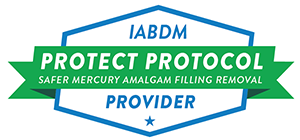Periodontal Disease's Impact on Overall Health

When we refer to "periodontal," we are talking about the structural components that anchor our teeth in place. This is analogous to the foundation of a house, providing stability and security to our teeth. The periodontal structure includes our gums, the bone surrounding our teeth, and other essential elements.
Understanding periodontal health involves recognizing how to maintain these components to ensure our teeth remain healthy and strong. In this article, we will discuss periodontal diseases, their impact on overall health, and how they are treated here at enlightenDENTAL.
Periodontal Disease and Oral Systemic Health
Periodontal disease is an infection and inflammation of the gums and other structures around the teeth. It begins with the buildup of plaque, a sticky film of bacteria that forms on the teeth. If not removed through regular brushing and flossing, plaque can harden into tartar, leading to inflammation and infection of the gums. Periodontal disease progresses through several stages:
Gingivitis: The earliest stage, characterized by red, swollen, and bleeding gums. It is reversible with good oral hygiene, proper diet, nasal breathing, and professional assessment and treatment.
Periodontitis: If left untreated, gingivitis can advance to periodontitis. This stage involves the formation of pockets between the teeth and gums, which become infected. The body’s immune response and bacterial toxins start to break down the bone and connective tissue that hold teeth in place.
Signs to Identify if You May Have Periodontal Disease
Recognizing the signs of periodontal disease early can prevent serious damage.
Here are some symptoms to watch for:
- Red, swollen, or tender gums
- Gums that bleed easily, especially when brushing or flossing
- Persistent bad breath or bad taste in the mouth
- Receding gums, making teeth look longer
- Formation of deep pockets between teeth and gums
- Loose or shifting teeth
- Changes in bite alignment
How We Treat Periodontal Disease
At our clinic, we are committed to providing cutting-edge treatments for periodontal disease to ensure the best outcomes for our patients. We incorporate advanced therapies such as ozone therapy, biofilm therapy, and biocompatible periodontal therapy to address the root causes of gum disease and promote optimal oral health.
Furthermore, to fully address health concerns, including periodontal health, we use various advanced methods to find the root cause. We incorporate sleep studies to assess breathing and airway health, microbiome testing with Bristle to analyze the oral microbiome to provide insights into oral health by identifying and measuring over 700 types of bacteria. This testing reveals the balance of good and bad microbes that impact oral diseases such as dental caries, periodontitis, and oropharyngeal cancer.
Additionally, through pH salivary testing to evaluate oral and overall health and detailed discussions about nutrition, we can get a clear picture of what affects a person's health. This approach is particularly important for periodontal health, as it helps us identify underlying problems like bacterial imbalances or dietary deficiencies that may contribute to gum disease, allowing us to create personalized plans to improve oral and overall well-being.
Ozone Therapy in Periodontal Treatment
Ozone therapy is a revolutionary approach in dental care that utilizes ozone gas (O3) to treat periodontal disease. Ozone has powerful antimicrobial properties, making it highly effective in eliminating bacteria, viruses, and fungi that contribute to gum infections.
Here’s how it works:
-Antimicrobial Action: Ozone penetrates the gum tissues and periodontal pockets, destroying harmful microorganisms without harming healthy tissue. This helps reduce infection and inflammation.
-Oxygenation: Ozone therapy improves oxygen delivery to the affected areas, enhancing the healing process and promoting healthier gum tissues.
-Safe and Painless: Ozone treatment is minimally invasive and typically painless, making it a comfortable option for patients with periodontal disease.
By incorporating ozone therapy into our periodontal treatments, we can effectively manage bacterial infections, reduce inflammation, and support the natural healing of gum tissues. Additionally, all treatments completed in our office are done with ozonated water!
Guided Biofilm Therapy
Guided Biofilm Therapy (GBT) redefines dental care with its innovative integration of advanced technologies for enhanced patient comfort and treatment efficacy. By utilizing temperature-regulated water and disclosing agents, GBT ensures a soothing experience and thorough plaque removal. The erythritol-based AIRFLOW® Powder PLUS efficiently eliminates biofilm and calculus without damaging dental or soft tissues. GBT's meticulous approach sets a new standard for dental cleanings, promoting optimal oral hygiene while prioritizing patient comfort.
Biofilm therapy involves:
-Mechanical Disruption: We use specialized tools and techniques to mechanically disrupt and remove biofilms from the teeth and gum surfaces.
-Antimicrobial Agents: Targeted antimicrobial agents are applied to break down the biofilm matrix and eliminate the bacteria within.
By targeting biofilms directly, we can achieve more effective removal of harmful bacteria, reducing inflammation and supporting overall periodontal health.
Biocompatible Periodontal Therapy
Biocompatible periodontal therapy focuses on using materials and techniques that are compatible with the body's natural biology, reducing the risk of adverse reactions and promoting better healing.
This approach includes:
-Non-Toxic Materials: We use biocompatible materials for periodontal treatments, such as grafts and sutures, that integrate seamlessly with the body’s tissues.
-Minimally Invasive Techniques: Our procedures are designed to be as minimally invasive as possible, reducing trauma to the tissues and promoting faster recovery.
-Holistic Care: We consider the patient's overall health and well-being, incorporating airway-centered analysis, nutritional guidance, stress management, and lifestyle changes to support periodontal health.
-Laser Technology: In some cases, laser therapy is used to further disrupt biofilms and sterilize periodontal pockets, promoting better healing and reducing bacterial load.
Biocompatible periodontal therapy ensures that our treatments are safe, effective, and conducive to the body’s natural healing processes.
What Happens if Periodontal Disease is Left Untreated?
Periodontal disease, if left untreated, can lead to severe oral health problems and has far-reaching effects on overall health. The chronic inflammation and infection associated with periodontal disease can contribute to the development of various systemic conditions, significantly impacting the body beyond the mouth.
Cardiovascular Disease and the Metabolic Connection
One of the most concerning consequences of untreated periodontal disease is its link to cardiovascular disease. Chronic inflammation from gum disease can contribute to the development of atherosclerosis (hardening of the arteries). Bacteria from periodontal infections can enter the bloodstream, leading to inflammation and plaque buildup in the arteries, which increases the risk of heart attack and stroke.
The metabolic connection, also known as metabolic syndrome, includes a cluster of conditions such as high blood pressure, high blood sugar, excess body fat around the waist, and abnormal cholesterol levels. Studies have shown that periodontal disease can exacerbate these conditions, creating a cycle of inflammation and poor health outcomes. This interconnection highlights the importance of maintaining periodontal health to prevent and manage cardiovascular and metabolic diseases.
Oral Bacteria and Cancer
The International Academy of Oral Medicine and Toxicology (IAOMT) has conducted extensive research on the connection between oral bacteria and cancer. Chronic periodontal infections are a source of continuous inflammation and bacterial load in the body. Certain bacteria associated with gum disease, such as Fusobacterium nucleatum, have been linked to colorectal cancer. The inflammatory response triggered by these bacteria can create an environment conducive to cancer development and progression. This underscores the critical need for effective periodontal disease management to reduce cancer risks.
Periodontitis and Atherosclerotic Cardiovascular Disease
Periodontitis, the advanced stage of periodontal disease, is strongly associated with atherosclerotic cardiovascular disease (ACVD). The IAOMT highlights that the bacteria and inflammatory mediators from periodontal infections can enter the bloodstream, contributing to the formation and rupture of atherosclerotic plaques. This process can lead to severe cardiovascular events, such as heart attacks and strokes. Managing periodontitis is crucial in mitigating the risk of ACVD and maintaining cardiovascular health.
Pathogen and Host-Response Markers Correlated with Periodontal Disease
Periodontal disease involves a complex interaction between pathogenic bacteria and the host's immune response. The IAOMT has identified specific pathogen markers, such as Porphyromonas gingivalis, and host-response markers, including elevated levels of C-reactive protein (CRP) and interleukins. These markers are correlated with the severity of periodontal disease and can provide insights into the individual's risk for systemic conditions. Monitoring these markers can help in the early detection and targeted treatment of both periodontal and systemic diseases.
Systemic Diseases Caused by Oral Infection
The systemic implications of oral infections are extensive and varied. According to the IAOMT, untreated periodontal disease can lead to a range of systemic diseases, including:
-Diabetes: There is a bidirectional relationship where periodontal disease can worsen blood sugar control, and diabetes can increase the severity of gum disease.
-Respiratory Infections: Bacteria from periodontal disease can be inhaled into the lungs, causing or exacerbating respiratory conditions such as pneumonia.
-Adverse Pregnancy Outcomes: Pregnant women with periodontal disease are at higher risk for preterm birth and low birth weight babies.
-Rheumatoid Arthritis: Chronic inflammation from periodontal disease can contribute to the development and severity of rheumatoid arthritis.
How to Maintain Your Periodontal Health
Maintaining periodontal health is essential for overall well-being. Healthy gums not only support your teeth but also contribute to preventing various systemic health issues. Here are key strategies to keep your periodontal health in top shape, including dietary choices, breathing techniques, effective flossing, regular check-ups, and advanced treatments.
Diet - The Dental Diet
Your diet plays a crucial role in maintaining periodontal health. Leafy greens, crunchy fruits and vegetables, grass-fed, organic meat, raw dairy products, and nuts and seeds are all beneficial for periodontal health. They provide essential vitamins, minerals, and nutrients like vitamin C, calcium, and omega-3 fatty acids, which strengthen gums, remineralize tooth enamel, and reduce inflammation.
Nasal Breathing to Protect the Oral Microbiome
Nasal breathing plays a crucial role in maintaining the balance of oral microbiota. Breathing through the nose helps filter and humidify the air before it enters the mouth. Practice nasal breathing techniques to promote oral health and support the natural balance of bacteria in the mouth.
Stay Hydrated to Maintain Oral pH
Drinking an adequate amount of water throughout the day helps keep the oral pH level neutral, preventing the growth of acid-loving bacteria that contribute to gum disease and tooth decay. Aim to drink water after meals and snacks to rinse away food particles and neutralize acids in the mouth.
Flossing with Risewell Floss
Daily flossing is crucial for removing plaque and food particles from between teeth and along the gumline. Risewell Floss is an excellent option for maintaining periodontal health due to its natural ingredients, effective cleaning ability, and gentle design that prevents gum irritation and bleeding.
Regular Check-Ups - Periodontal Maintenance
Regular dental check-ups are crucial for early detection and management of periodontal disease. During periodontal maintenance visits, professional cleaning removes plaque and tartar, while examinations check for signs of gum disease such as inflammation and bleeding. Personalized advice is then provided to maintain gum health based on individual needs.
Perio Protect When Needed
Perio Protect offers a minimally invasive, highly effective treatment for gum disease, providing customized trays that deliver medication directly to periodontal pockets, reducing bacteria and inflammation. This at-home treatment option is convenient and easy to follow, offering a non-surgical alternative for managing gum disease and promoting healing.
Electric Toothbrush
Electric toothbrushes offer significant benefits for oral hygiene, including superior plaque removal compared to manual brushing, built-in timers to ensure thorough brushing for the recommended two minutes, and ease of use, particularly beneficial for those with limited manual dexterity.
Conclusion
Maintaining your periodontal health requires a comprehensive approach that includes a nutritious diet, proper breathing techniques, effective flossing, regular dental check-ups, and the use of advanced treatments and tools. By incorporating these strategies into your daily routine, you can ensure healthy gums and a brighter smile, while also reducing the risk of systemic health issues linked to periodontal disease.
If you have any questions or need personalized advice, enlightenDENTAL is here to help. Contact us to schedule your next check-up and take the next step towards optimal periodontal health!



.png)


